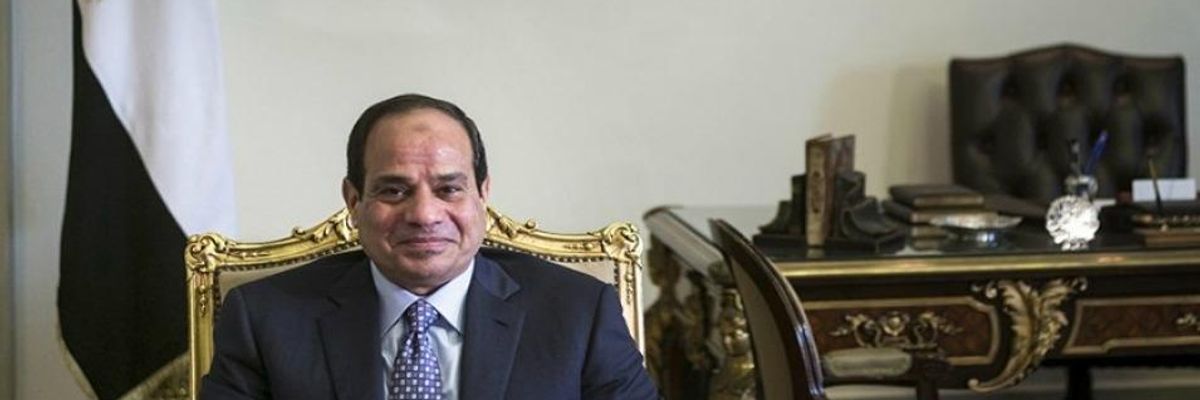Despite widespread repression of human rights activists, political opponents, and journalists that have garnered worldwide condemnation, the Egyptian government will once again be the recipient of U.S. weapons shipments and military aid after the Obama administration announced it was ending a freeze of such support on Tuesday.
A White House statement described how President Obama spoke with Egyptian President Abdelfattah al-Sisi and said that despite "continued imprisonment of non-violent activists and mass trials" in Egypt, he would lift "executive holds that have been in place since October 2013 on the delivery of F-16 aircraft, Harpoon missiles, and M1A1 tank kits." In addition, Obama assured al-Sissi that he will continue to request an annual $1.3 billion in military assistance for Egypt.
The move comes as Egypt has joined with Saudi Arabia and other Arab nations to launch airstrikes, and possibly a ground invasion, of Yemen--a development which is further destabilizing a region in which ongoing conflicts are now underway in Libya, Syria, Iraq, and many places in between.
Critics of the al-Sisi regime say that his takeover in 2013 was nothing short of a military coup and that the government's behavior since then has been a series of authoritarian steps which have taken Egypt back to the repressive days of Hosni Mubarak, the dictator who was deposed during the Arab Spring uprising in 2011.
Human Rights Watch, Amnesty International, the Committee to Protect Journalists, and others have repeatedly slammed Egypt for its human rights record and backtracking on reforms.
The New York Timesreports that the lifting of the arms embargo by the Obama administration signals "a geopolitical trade-off for the American leader" which, in effect, shows that the U.S. government is "done punishing Cairo for toppling an elected president and that [President Obama] was instead focusing on the shared goal of combating extremist elements in Libya and Yemen."
As recent coverage by Common Dreams has cataloged, Egypt under the control of President al-Sissi has been marked by widespread repression of journalists, human rights abuses, and a brutal crackdown on political opponents.
According to Time magazine's Mark Thompson:
The resumption of arms shipments to Egypt is in keeping with the growth of U.S. arms sales abroad. Major American weapons exports grew by 23% between 2005-2009 and 2010-2014, the Stockholm International Peace Research Institute (SIPRI) said on March 16. "The USA has long seen arms exports as a major foreign policy and security tool," Aude Fleurant, of SIPRI, said when the group released its annual arms-sales accounting. "But in recent years exports are increasingly needed to help the U.S. arms industry maintain production levels at a time of decreasing U.S. military expenditure."
The White House announcement wasn't only about weapons. "President Obama also reiterated U.S. concerns about Egypt's continued imprisonment of non-violent activists and mass trials," it said in a statement. And, as the Administration drafts proposed legislation to resume military aid to Egypt, it "will not make the so-called 'democracy certification' in that legislation," National Security Council spokeswoman Bernadette Meehan said.
In other words, Egypt remains little more than a military junta now wearing civilian clothes, and the White House won't pretend otherwise.
Journalist and political observer Glenn Greenwald was incensed by the latest development, writing at The Intercept:
The move comes as the U.S. is also heavily supporting the Saudi-led bombing campaign in Yemen, also involving some of the region's worst tyrants (also known as: the U.S.'s closest allies). So the U.S. is, as usual, standing shoulder to shoulder with some of the region's most oppressive regimes, whose survival at least partially depends on the abundant U.S. largesse they receive, once again provoking that age-old mystery: Why do they hate us?
Obama's move is as unsurprising as it is noxious, as American political elites -- from Bill and Hillary Clinton to Henry Kissinger and Madeleine Albright -- along with the Israeli Right have been heaping praise on Sisi the way they did for decades on Mubarak. ("I really consider President and Mrs. Mubarak to be friends of my family," said Hillary Clinton in 2009. "So I hope to see him often here in Egypt and in the United States.")
Who is more tragically propagandized: those who actually believe that U.S. foreign policy is motivated by a desire to spread freedom and democracy for women, gays, and human beings generally, or those who scoff with unbridled contempt whenever the suggestion is made with a straight face?

